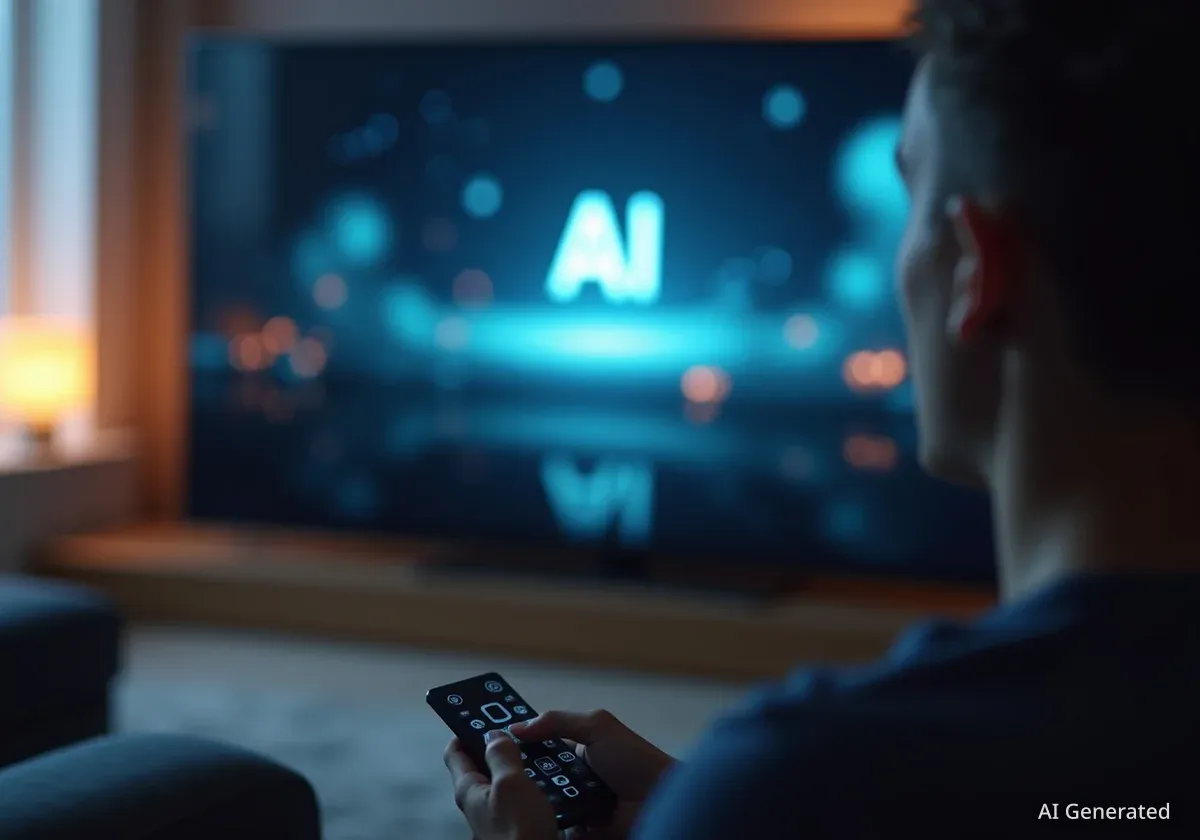Google has integrated its Gemini artificial intelligence model into the Google TV platform, enabling users to interact with their televisions using conversational language. According to a company announcement, the update allows viewers to ask for personalized recommendations, get plot summaries, and even request information on topics beyond entertainment, such as recipes or homework help.
Key Takeaways
- Google TV now features the Gemini AI assistant, activated by the "Hey, Google" command.
- Users can ask complex, conversational questions for movie recommendations, show summaries, and general queries.
- The feature is currently available on the TCL QM9K and is scheduled for release on more devices from Hisense, Walmart, and other TCL models later this year.
- This integration is part of Google's broader strategy to embed AI across its product ecosystem, a move that has significantly increased its market valuation.
Enhanced Viewing with Conversational AI
The introduction of Gemini to Google TV transforms the television from a passive display into an interactive hub. The AI assistant functions similarly to its mobile and tablet counterparts, allowing for natural language queries without rigid command structures. This means users can speak to their TV as they would to another person.
For example, a couple undecided on what to watch can ask Gemini, "Find a movie for us; I like dramas, but my partner prefers comedies." The AI is designed to understand the nuance and provide a suitable suggestion. This moves beyond simple genre filtering and into contextual understanding.
Beyond Entertainment
While the primary focus is on media, Gemini's capabilities on Google TV extend to general knowledge. The company confirmed users can ask for things like recipes or assistance with homework, turning the television into a multi-purpose smart device.
Navigating Content with Ease
Gemini also helps viewers catch up on complex storylines. A user could ask for a summary of the previous season of a show like The Witcher before starting the new one. This feature is intended to make it easier for viewers to jump back into series they haven't watched in a while.
The system can also handle vague requests. According to Google's blog post, a user can ask, "What's the new hospital drama everyone's talking about?" and Gemini will analyze current trends to provide an accurate answer. This demonstrates a shift from keyword-based search to intent-based discovery.
Platform Availability and Rollout Schedule
The Gemini integration is not yet available on all Google TV devices. The initial launch is limited to specific, newer models, with a wider rollout planned throughout the year and into 2025.
Currently available on:
- TCL QM9K
Coming later in 2024:
- Google TV streamer devices
- Walmart onn. 4K Pro streamer
- Hisense U7, U8, and UX models
Scheduled for 2025 models:
- TCL QM7K, QM8K, and X11K
Google has not provided an exact timeline for these updates, stating only that they will arrive "later this year" for the 2024 batch. This staggered release allows the company to gather data and refine the experience before a widespread deployment.
Part of a Larger Corporate AI Strategy
The integration of Gemini into Google TV is a single component of a much larger corporate initiative. Google has been systematically embedding its AI technologies across its entire suite of products, signaling a fundamental shift in its business focus from online search to artificial intelligence.
Google's AI Ecosystem
Recent AI-powered updates from Google include integrating Gemini into the Chrome browser to assist with writing and research, and providing advanced AI video generation tools, known as Veo 3, to creators on YouTube. These moves show a consistent strategy to make AI a core part of the user experience on all major Google platforms.
This strategic pivot has been in development for years, as machine learning has long been a part of Google's infrastructure. However, the recent public-facing launches of powerful generative AI models like Gemini represent a more aggressive and visible push into the AI space, positioning it as a direct competitor to other major tech firms investing heavily in AI.
Broader Industry Implications and Concerns
While Google's AI push has been met with enthusiasm from investors, it also raises significant concerns across various sectors. The company's move to provide AI-generated answers directly at the top of search results has created tension with online publishers, who rely on traffic from search queries.
Furthermore, the proliferation of powerful AI tools has led to an increase in AI-generated content online, making it more difficult to distinguish between human-created and machine-created information. The rise of deepfake technology, which can create realistic but fabricated images and videos of individuals, also presents challenges for public figures and society at large.
Despite the potential human and environmental costs of AI, Google's valuation has ballooned, making it the fourth company ever to hit a $3 trillion market valuation.
Wall Street has largely rewarded technology companies for their investments in AI. Investors often view Big Tech and AI as relatively stable investments amid ongoing market uncertainty. However, some analysts are beginning to express caution, suggesting that the initial hype around AI may be outpacing its practical, short-term applications and profitability.





